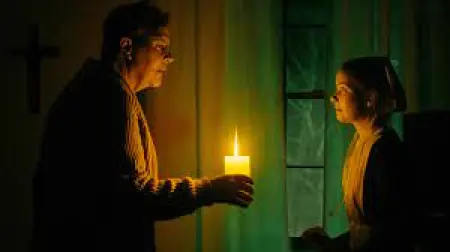

The need for redemption, the desire to right a wrong, can be a powerful driving force in a story, and in Cameron Beyl’s The Veil such a concept is wrapped in a healthy dose of high strangeness and cosmic horror.

Douglas is a retired priest living reclusively in the PA countryside, occasionally emerging to assist in various community goings on. One night, during a rare aerial phenomenon, he encounters a young Amish woman who not only appears to be lost but seems eerily familiar. Soon, Douglas is forced not just to deal with an increasingly panicked stranger fleeing…someone, but also a mysterious event from his past that has haunted him for decades.

Beyl’s intent on telling a story about coming to terms with a perceived failure in your past is noble, and it’s an interesting idea cloaked in an unquestionably beautiful setting; the Pennsylvania Dutch countryside cloaked in the green glow of the aurora borealis (at this time of year? At this time time of the day? In this part of the country?) gives the entire film a truly dreamlike feeling. Unfortunately, the moment at the beginning of the film that is supposed to be haunting Douglas is never really given much emphasis for the rest of the film until the end of the film, and thus it lacks the emotional weight needed to really deliver on what Beyl wants to do. This is also a rare example of a film that I feel could’ve been a bit longer; normally I appreciate a film running under ninety minutes, but I think this could’ve done more with a slightly longer run time. Sean O’Bryan and Rebekah Kennedy are fantastic in this film; O’Bryan completely sells the audience on his depiction of a priest who just be ready to retire from everything by the time the events of the film roll around, and Kennedy is equally adept at portraying Hannah as a confused and terrified young woman unsure of her new companion’s intentions. Theirs is a solid emotional core for a film unsure of how to execute the rest of its intentions in the same way.

The Veil is fun eerie romp that never quite finds its footing and feels like it gallops to an abrupt and somewhat predictable ending. It is by no means a bad film; Beyl and everyone involved are clearly competent filmmakers and performers. It seeks to tell a story of redemption, and in that regard, I suppose it’s successful, but in the end, it feels almost like Alexander’s approach to the Gordian knot. There’s a fascinating concept there that definitely has the potential for a compelling story, but alas it all feels rushed and frustratingly underdone.




